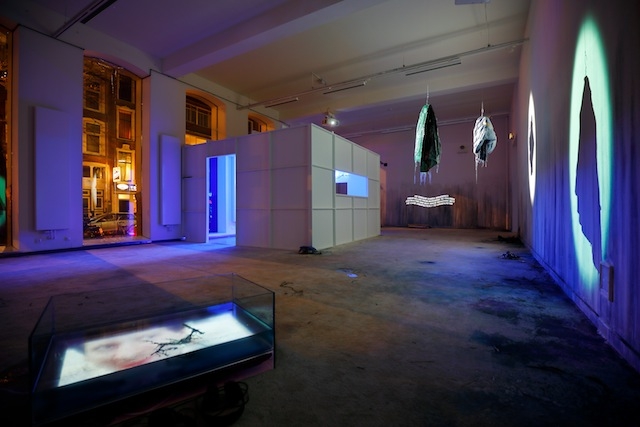Witte de With Center for Contemporary Art, Rotterdam, 27 January – 2 April
From the street he is clearly visible: the man-size cleaner, a stick figure fashioned from wire with a monitor for a head, mopping the floor on the other side of the window. His screen shows text flashing past. ‘I need to clean the floor,’ it says, ‘cleaning the mess of Gregor and his octopus.’ He seems to want to entice passersby inside. ‘Come and join us / come to the bar / have a glass of vodka.’ Act upon the invitation and you enter a thoroughly drenched environment, as if it were somehow raining indoors. Water streams down the windows (and runs to a gutter, from where it’s pumped around the system again). The white carpet is wet. The walls have been sprayed with diluted ink. Sogginess abounds.
Where have we ended up? Who is this Gregor? A video on a screen under a glass water tank gives a clue: Gregor Samsa turns out to be a tortured writer, frantically trying to write in octopus ink freshly obtained from the market. The black liquid splashes in all directions. Then we see the writhing arms of an octopus and hear pitter-pattering raindrops and a woman’s groans, lending the images a suggestion of sultry eroticism. Splayed out beside the tank is the flaccid body of an octopus, cast in bronze.
Samsa is the protagonist of Prouvost’s six-part film The Wanderer (2012) – an excerpt from which is on show, and which the rest of the exhibition ‘translates’ into installation. The film is based on a curious translation of Franz Kafka’s Metamorphosis (1915): curious because the work was translated from German into English by someone with no knowledge of German whatsoever, resulting in all kinds of absurd misunderstandings. What can be confidently ascertained is that Kafka’s original tale has been completely lost. Prouvost, a French artist who has lived in the UK since she was nineteen, loves this kind of communication breakdown.
This obviously does nothing for the story’s intelligibility. On several areas of the carpet, pools of synthetic resin – in which all manner of rubbish has coagulated: rusty beer cans, halved gherkins, shoes, mussels, many twigs and leaves – have been deposited. Like the large branch with a soaked scarf hanging from it, attached high onto the wall, and the two dripping suits suspended from the ceiling, the pools appear to mark a place where something dramatic has happened. The suggestion of death by drowning raises its head, but never takes concrete form. Two drawings on panels, smudged with wax, show ghostly figures breathing through a tube.
The eye-catcher in the installation is the vodka bar, bathed in black light. Resting on two tables are fountains spraying diluted ink, surrounded by numerous vodka glasses in which the ink has already sunk to the bottom (and there’s no vodka in there). White neon letters on the wall read: ‘Citizens or gods, men are truly stuck’. Samsa’s lamentation also resounds from speakers, alternated with shards of conversations and the instantly recognisable guitar intro from Prince’s Purple Rain.
Words transform into images, images into sounds; it’s a multiple collision of signs and meanings. The staging is intriguing, rousing one’s curiosity but hard to get a handle on. ‘Slippery when wet’ would be an understatement here. The existential angst manifest in Kafka’s novella, the sense of alienation and exclusion, have made way for a steamy interplay of forces around drinking and drowning in which the problem of writing, of the imagination itself, comes floating to the surface. La Pluie (projet pour un texte), a short film by Marcel Broodthaers from 1969, springs to mind. The artist sits outside at a low table, writing in a notebook with a fountain pen while rain comes down in torrents, washing the words away; the man continues to write regardless. Both Broodthaers and Prouvost consider the translation of one language into another – literature into film, film into sculpture – and everything that can get lost in the process. Every translation is inadequate, gets out of hand, leads to absurd misunderstandings, but is carried out with tenacity nonetheless, imagination running riot. ‘One last shot of vodka?’ the cleaner asks. Sure, why not?
From the April 2017 issue of ArtReview
